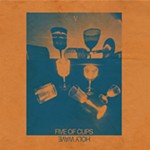Tori Amos@Bass Concert Hall
Live Shot
Reviewed by Christopher Gray, Fri., Nov. 9, 2001
Tori Amos@Bass Concert Hall
November 2"Do you want to see my pictures of Tori?" The breathless fan paged through her photo album, offering glimpses of her portable shrine to the line waiting to enter UT's Bass Concert Hall. Admittedly, the performance itself began with all the familiar Tori-associated clichés present and accounted for, from the sold-old throng's shrieks of delight when Amos first walked onstage to the evening's set list, which ran to the cryptic the way Russian novels run to the morose. After an introductory light show set to "Bonnie & Clyde '97," Eminem's harrowing hip-hop murder ballad transformed into the centerpiece of Amos' new album Strange Little Girls, opener "Juarez" found the talent hammering her piano's internal strings like she was trying to exorcise any stray demons the instrument might have picked up in transit. "China," on the other hand, from Amos' first LP Little Earthquakes, resonated as an immaculate portrait of a relationship beset by a seemingly insurmountable personal distance. Some songs, specifically "Past the Mission" and "Space Dog," were altogether too crowded, like several musical ideas held together by a handful of arbitrary transitions. Amos is without question an amazing piano player, equally capable of delicate right-hand arpeggios and ferocious bass-clef rumblings that would make Rachmaninoff proud, but the songs that came through the clearest (underrated B-side "Never Seen Blue," and the rigidly maternal "Tallulah") found her staying in one part of the keyboard. Her electric-piano rendition of Bob Geldof's "I Don't Like Mondays," one of only three songs from Strange Little Girls, was whisperingly elegiac, but ironically, Amos needed only her satin-tinged voice to deliver the night's true show-stopper. An a cappella reading of "Me & a Gun," Little Earthquakes' uncomfortably vivid account of adolescent rape, brought the house to a rapt standstill as Amos imbued it with the same ethereal gloom as Sinead O'Connor's "I Am Stretched on Your Grave." Everything that followed, including a heartfelt encore of Stevie Nicks' "Landslide," was somewhat anticlimactic, but Amos, with grace and good humor, continued to appease her acolytes as she ably demonstrated for newcomers why she inspires such zealous personal devotion in the first place. So did tousle-headed opener Rufus Wainwright, whose easy banter, jaunty melodies, and fetching lyrics about cigarettes and chocolate milk, California, and becoming a man elicited whoops from the crowd that suggested he's well on his way to accruing a Tori-like cult of his own.










